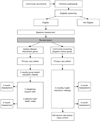The South Asian Heart Lifestyle Intervention (SAHELI) study to improve cardiovascular risk factors in a community setting: design and methods
- PMID: 24060673
- PMCID: PMC4030403
- DOI: 10.1016/j.cct.2013.09.007
The South Asian Heart Lifestyle Intervention (SAHELI) study to improve cardiovascular risk factors in a community setting: design and methods
Abstract
Disseminating and implementing evidence-based, cardiovascular disease (CVD) prevention lifestyle interventions in community settings and in ethnic minority populations is a challenge. We describe the design and methods for the South Asian Heart Lifestyle Intervention (SAHELI) study, a pilot study designed to determine the feasibility and initial efficacy of a culturally-targeted, community-based lifestyle intervention to improve physical activity and diet behaviors among medically underserved South Asians (SAs). Participants with at least one CVD risk factor will be randomized to either a lifestyle intervention or a control group. Participants in both groups will be screened in a community setting and receive a primary care referral after randomization. Intervention participants will receive 6weeks of group classes, followed by 12weeks of individual telephone support where they will be encouraged to initiate and maintain a healthy lifestyle goal. Control participants will receive their screening results and monthly mailings on CVD prevention. Primary outcomes will be changes in moderate/vigorous physical activity and saturated fat intake between baseline, 3-, and 6-month follow-up. Secondary outcomes will be changes in weight, clinical risk factors, primary care visits, self-efficacy, and social support. This study will be one of the first to pilot-test a lifestyle intervention for SAs, one of the fastest growing racial/ethnic groups in the U.S. and one with disparate CVD risk. Results of this pilot study will provide preliminary data about the efficacy of a lifestyle intervention on CVD risk in SAs and inform community-engaged CVD prevention efforts in an increasingly diverse U.S. population.
Trial registration: ClinicalTrials.gov NCT01647438.
Keywords: Cardiovascular disease prevention; Culture; Lifestyle intervention; Randomized control trial; South Asian.
© 2013.
Figures


References
-
- Asian American Justice Center and Asian Pacific American Legal Center. A Community of Contrasts: Asian Americans and Pacific Islanders in the United States. 2012.
-
- South Asian Americans Leading Together. A Demographic Snapshot of South Asians in the United States. 2012 Available from: http://saalt.org/resources/reports-and-publications/#factsheets.
-
- McKeigue PM, et al. Association of early-onset coronary heart disease in South Asian men with glucose intolerance and hyperinsulinemia. Circulation. 1993;87(1):152–161. - PubMed
-
- Anand SS, Yusuf S. Risk factors for cardiovascular disease in Canadians of South Asian and European origin: a pilot study of the Study of Heart Assessment and Risk in Ethnic Groups (SHARE) Clin Invest Med. 1997;20(4):204–210. - PubMed
Publication types
MeSH terms
Substances
Associated data
Grants and funding
LinkOut - more resources
Full Text Sources
Other Literature Sources
Medical

